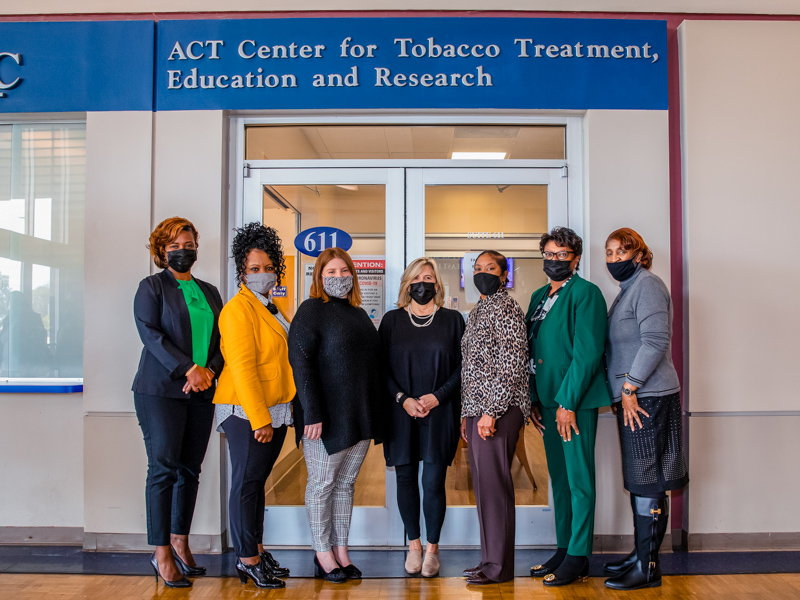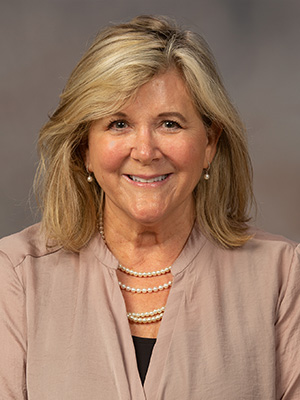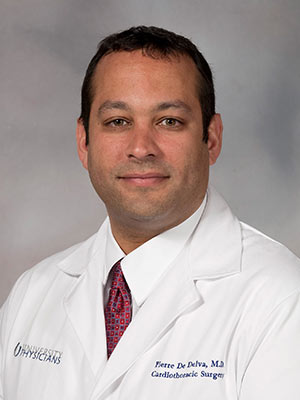ACT Center, CCRI help patients tackle tobacco

Thursday, November 18 is the Great American Smokeout, the American Cancer Society’s annual event to encourage tobacco users to put down their cigarettes for the last time.
But quitting cold turkey a week before Thanksgiving is not your only option.
Since 1999, the ACT Center for Tobacco Treatment, Education and Research at UMMC has helped more than 40,000 people quit tobacco products over the past 22 years, said Dr. Karen Crews, the Center’s director.
Around three percent of people who try to quit without help succeed, Crews said. The most effective way to quit tobacco products is with an individualized treatment plan.

“The data show that a combination of counseling and medication at least doubles the chances of quitting,” Crews said.
The ACT Center has a team of certified tobacco treatment counselors at their Jackson Medical Mall location who work with patients trying to quit smoking and other tobacco products. They use a combination of behavioral counseling and medication therapies such as nicotine gum, lozenges and patches, or the prescription drug bupropion.
“We’re not the smoking police. We’re here for support and guidance,” said Sharon Bell, a tobacco treatment counselor at the ACT Center.
Brittany Tichenor, another tobacco treatment counselor, said the first step in the Center’s counseling process is an individualized assessment.
“We ask about smoking history, quitting history, their living environment and triggers, and we build a customized treatment plan based on their needs,” Tichenor said.
A typical counseling plan at the ACT Center involves a series of six visits, with follow-ups at three, six and 12 months.
“The biggest component of counseling is understanding why and when people smoke,” said Anastasia Smith-McEwen, tobacco treatment counselor. She says many patients feel the urge “the first thing in the morning, when their nicotine levels are low.”
Other cues might be situational, like after a meal, while watching television, or driving, or based on an emotional state, like frustration or sadness, Smith-McEwen said.
While each person has their own motivation for trying to quit, they all can experience the same benefit: better health.

“We know that between five and eight million people around the world die of tobacco-related diseases every year,” said Dr. Pierre de Delva, UMMC associate professor of surgery and head of the Cancer Center and Research Institute’s thoracic cancer program.
Smoking causes and contributes to several of the leading causes of death and disease in the U.S, including cancer, heart disease, lower respiratory disease and stroke. It’s a massive contributor to lung cancer, de Delva’s specialty. He says about 80 percent of lung cancer is related to smoking, and that unless detected early, it has one of the highest mortality rates.
“Any dose or exposure to tobacco smoke, even secondhand smoke, is related to increased risk of lung cancer,” de Delva said. “The most important thing we can do to decrease lung cancer mortality is to decrease smoking.”
As a dentist, Crews says that there are risks to the oral cavity from tobacco use that include tooth loss and gum disease. Prolonged tobacco use also contributes to less common oral cancers of the tongue, floor of the mouth, tonsils and other soft tissues.
Oral cancer might only account for about three percent of cancers overall, “but it’s 100% to the people who are diagnosed with them,” she said.
Crews said another less-noted complication from smoking is Buerger’s Disease, a disease that affects blood flow and can cause discoloration, pain, and in severe cases gangrene, in the hands and feet.
Tobacco use can also exacerbate co-existing conditions. For instance, people with diabetes who also smoke are more likely to require amputation, or experience worse outcomes if they catch pneumonia or another infectious respiratory disease.
While smoking has profound negative effects on health, it’s never too late to quit and improve your condition, de Delva said.
“If you stop smoking, these risks can decrease,” de Delva said. “Smoking cessation has both immediate and long-term benefits.”

According to the CDC, blood levels of nicotine and carbon monoxide lower to the level of a non-smoker in a matter of days. After three years, risk of heart disease drops by half, while risk of mouth cancers drop by half in about five years. Risk of lung cancer takes about 10 years to drop that amount.
When patients who smoke come to de Delva’s team at the CCRI, they encourage them to get help as soon as they can.
“We’re lucky to be based at the Jackson Medical Mall, where we can refer patients to the ACT Center and their team can see them that same day,” de Delva said.
Whether you are trying to quit on your own or with the help of the ACT Center team, their tobacco treatment counselors have some advice to help on your journey.
First, make it harder to get to your cigarettes. Keep them away from places where you typically smoke, Tichenor said.
“Making your house smoke-free or your car smoke-free forces yourself to go through more effort to smoke,” Tichenor said. For example, if you keep cigarettes at your bedside, “move them somewhere inconvenient, like your car or your garage.”
Bell said another technique to help you quit is rate fading, or smoking fewer times each day until you’ve quit.
“If you typically smoke a pack a day, remove three from the pack and put them away in a Ziploc bag,” Bell said. The ones remaining in the box are your allotment for the day.
“To some people, smoking feels like a monster. If they keep feeding it, it will stay there,” Bell said. “If they feed it less, it will shrink.”
All of the counselors remind people that quitting takes time.
“I tell people, ‘if you’ve been smoking for 35 or 40 years, we can’t snap our fingers. There’s a process involved,” Smith-McEwen said.
“Remind yourself that [quitting tobacco] is a process,” Tichenor said. “If you continue to take small steps along the way, you will reach your goals.”
And if you’re struggling, understand that you’re not alone. While adult and youth tobacco has steadily declined over the past several decades, U.S. cigarette sales increased from 202.9 billion in 2019 to 203.7 billion in 2020, the first climb in 20 years. Meanwhile, a report from the North American Quitline Consortium stated that the 2020 call volume to state quitlines was down 27 percent compared to the previous year. Crews thinks the COVID-19 pandemic might be involved, whether it be extra stress, anxiety or limitations on in-person treatment options that make it harder to quit.
However, the ACT Center found ways to circumvent some of the pandemic challenges, Crews said. Counselors started meeting with clients via telephone calls and UMMC 2 You, the Medical Center’s Telehealth app for minor outpatient care.
Crews said the team is also in the process of moving into EPIC to allow the health care providers to see their patient’s tobacco use status. This will allow a team approach to treatment so that the progress with quitting can be acknowledged and supported by the health care team.
“The ACT Center is here to not only help patients quit tobacco but to also support the UMMC providers in their efforts to help Mississippians be healthy,” Crews said.
Ready to quit tobacco products?
Contact the ACT Center: (601) 815-1180
Contact the Mississippi Tobacco Quitline: (1-800) 784-8669 (QUITNOW)


